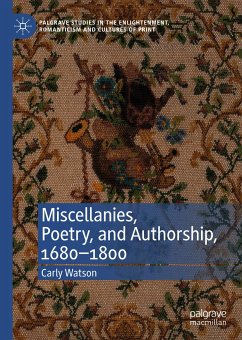
Compiling Texts in Eighteenth-Century Britain (eBook, PDF)
Mediating the Scottish Enlightenment
Versandkostenfrei!
Sofort per Download lieferbar
112,95 €
inkl. MwSt.
Weitere Ausgaben:

PAYBACK Punkte
56 °P sammeln!
This book argues that the act of compiling texts together into collections in the eighteenth century is politically and epistemologically significant. Focusing on the reception of Scottish Enlightenment ideas, and ranging across an Edinburgh print shop, an excluded religious community in the North of England, and the story worlds of novelists and poets, the study reveals compilation to be a politically resistant activity: it challenged centralizing and homogenizing tendencies within the growing British empire in the latter half of the eighteenth century and actively built counternarratives. Re...
This book argues that the act of compiling texts together into collections in the eighteenth century is politically and epistemologically significant. Focusing on the reception of Scottish Enlightenment ideas, and ranging across an Edinburgh print shop, an excluded religious community in the North of England, and the story worlds of novelists and poets, the study reveals compilation to be a politically resistant activity: it challenged centralizing and homogenizing tendencies within the growing British empire in the latter half of the eighteenth century and actively built counternarratives. Rebeca Araya Acosta offers a fresh view of eighteenth-century literary transaction and shows how practices of compilation in the period were more diversified and had a far greater impact on readers than their modern descendants.
Dieser Download kann aus rechtlichen Gründen nur mit Rechnungsadresse in A, B, BG, CY, CZ, D, DK, EW, E, FIN, F, GR, HR, H, IRL, I, LT, L, LR, M, NL, PL, P, R, S, SLO, SK ausgeliefert werden.












